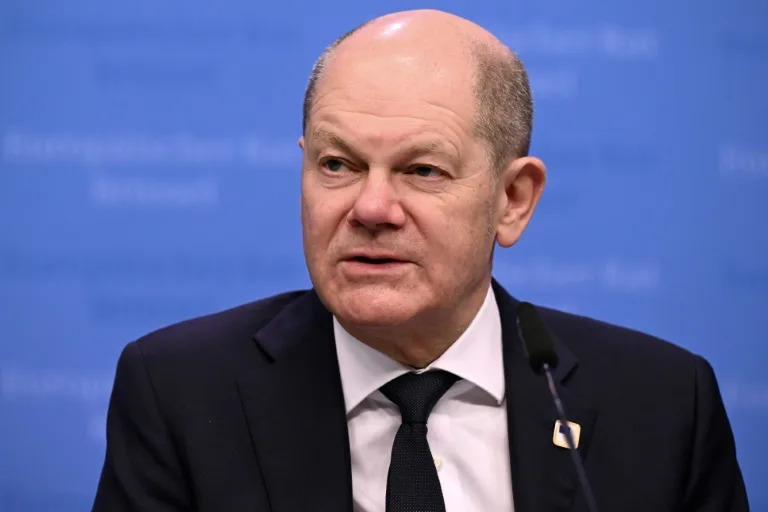Germany's Scholz between tough talk and trade on China trip

Chancellor Olaf Scholz travels to China this weekend, walking a fine line in shoring up economic ties with Germany's biggest trading partner at a time when the West is sharpening its tone towards Beijing.
Chancellor Scholz will have to balance encouraging words on economic cooperation with the EU's strident message accusing China of unfair subsidies.
With the economies of both China and Germany currently underperforming on the world stage, Scholz will travel with a bumper delegation of ministers and business executives.
The chancellor will have to balance encouraging words on economic cooperation with the European Union's strident message accusing China of unfair subsidies.
The German leader could also deliver a stern warning to China over its refusal to turn its back on President Vladimir Putin despite Russia's invasion of Ukraine.
China's President Xi Jinping and Scholz will hold talks in the Chinese capital on Tuesday at the conclusion of the trip, which will first take the chancellor to Chongqing and Shanghai.
The three-day tour is Scholz's second since taking office, the first coming in November 2022 with China still applying strict coronavirus rules.
Around 18 months on, the two major world economies are still struggling.
And the lineup of Scholz's delegation underlines his focus -- Volkswagen, Siemens and Bayer will count among bosses of blue-chip firms on the plane, German media reported.
Three cabinet ministers including transport minister Volker Wissing will also be on the tour.
The extended lineup was "really remarkable" and an indication that the emphasis of the trip would be on business ties, said Max Zenglein, chief economist at the Mercator Institute for China Studies in Berlin.
- 'Trade tensions' -
Western policymakers have become more circumspect in their attitude towards Beijing, with concerns that an overreliance on Chinese imports could become a liability.
Washington has moved to limit access for Chinese firms to the US market, while the European Union has taken aim at what it sees as unfair subsidies from Beijing for green technologies.
The European Commission on Tuesday opened a probe into Chinese wind turbine suppliers, following investigations into state aid for solar panels, electric cars and trains.
The EU moves have cranked up trade tensions, with China saying Wednesday it was "highly concerned" by the Commission's "discriminatory measures".
By contrast, Germany has shown a "friendlier face" to Beijing, attempting a "balancing act" in its economic relations with China, Zenglein said.
Scholz himself has characterised his approach as "derisking", urging companies not to "put all your eggs in one basket" and to nurture ties with other trading partners.
German businesses, however, remain highly dependent on the Chinese market, according to the IW economic research institute in Cologne.
In key areas such as chemicals or electronics there had been "no notable structural derisking", IW analyst Juergen Matthes told German financial daily Handelsblatt.
- 'Missed opportunity?' -
But analysts believe that Germany's economic clout gives it leverage over China, as they urged Scholz not to squander the opportunity.
While other countries were less receptive to Beijing's overtures, Germany "might underestimate how valuable of a partner they are for China", Zenglein said.
Failing to recognise its own importance would be "a bit of a missed opportunity" for Germany "in delivering really strong messages to Xi Jinping", Zenglein said.
US officials have repeatedly warned China against providing indirect aid to the Russian war effort.
With Scholz's visit coming on the heels of Russian Foreign Minister Sergei Lavrov's trip to Beijing, the German chancellor could use the occasion to push against further cooperation with Russia.
Beijing has gained more sway over Russia as Moscow has become more internationally isolated after invading Ukraine two years ago.
Ahead of the trip, Scholz's spokesman Steffen Hebestreit said it was clear that "China has influence on Russia".
"Our wish would be for China to be able to exercise the influence it has," Hebestreit said.
German Firms in China Cite Unfair Competition From Locals
Two-thirds of German companies operating in China say they face unfair competition in the market, a problem that threatens to push up their costs and erode profit margins.
That’s according to a survey by the German Chamber of Commerce in China released on Wednesday, days before German Chancellor Olaf Scholz is due to hold talks with Chinese President Xi Jinping in Beijing.
Some 65% of 150 respondents in the survey, conducted from late February to early March, said they see unfair competition in their business, primarily from Chinese private-sector firms. Large majorities said the consequences include increased pressure on costs, lower profits and a decline in market share.
The survey results underscore concerns that foreign businesses in China suffer disadvantages compared with their local counterparts. That point was repeatedly made by US Treasury chief Janet Yellen during her visit in the past week, along with warnings that ramped-up Chinese factory output will disrupt economies all over the world.
China counters that its own companies face discrimination in Western countries, citing US tariffs and a European probe into electric-car subsidies among the examples.
Read More: German Firms in China Say Economy Is on ‘Downward Trajectory’
While it didn’t define “unfair,” the German chamber’s survey listed preferential access for Chinese companies to government authorities, public tenders, and tax incentives and subsidies among areas where foreign companies are disadvantaged.
Scholz kicks off his four-day trip to China on April 16, his second visit to the country as head of government. He will meet Premier Li Qiang in addition to Xi.
China already faces a “big threat” from the trade war with the US, and domestic demand has been weak, Maximilian Butek, the chamber’s executive director for East China, told reporters at a press conference Wednesday in Beijing to mark the release of the survey.
“They need to export products. So if they also lose the European markets, it would be a certain threat for them,” Butek added. “Now the challenge for Scholz is to explain that to China.”
- Questions and Answers
- Opinion
- Motivational and Inspiring Story
- Technology
- True & Inspiring Quotes
- Live and Let live
- Focus
- Geopolitics
- Military-Arms/Equipment
- Segurança
- Economy/Economic
- Art
- Causes
- Crafts
- Dance
- Drinks
- Film/Movie
- Fitness
- Food
- Jogos
- Gardening
- Health
- Início
- Literature
- Music
- Networking
- Outro
- Party
- Religion
- Shopping
- Sports
- Theater
- Health and Wellness
- News
- Culture


